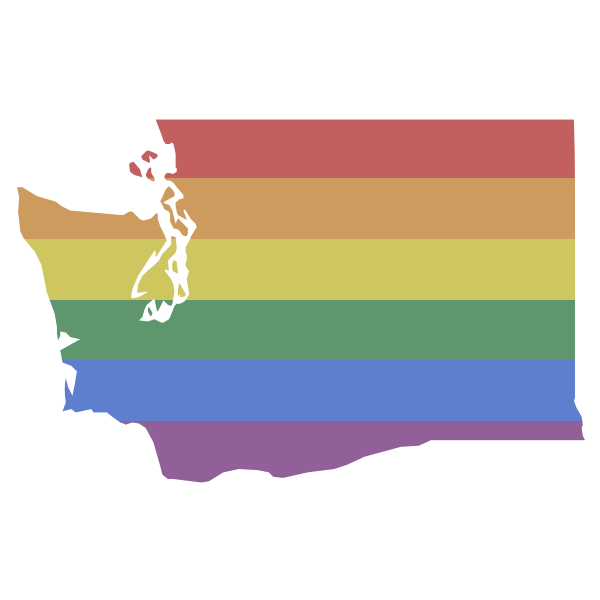- Homosexuality
- ⚢✔ Legal
- Gay Marriage
- ⚭✔ Legal
- Censorship
- ✔ No censorship
- Changing Gender
- ✔ Legal, no restrictions
- Gender-Affirming Care
- ✖ Legal, but restricted for minors
- Non-Binary Gender Recognition
- ✔ Recognized
- Hate Crime Protections
- ✔ Sexual orientation and gender identity
- Discrimination
- ✔ Illegal
- Employment Discrimination
- ✔ Sexual orientation and gender identity
- Housing Discrimination
- ✔ Sexual orientation and gender identity
- Adoption
- ✖ Married couples only
- Intersex Infant Surgery
- ✖ Not banned
- Military
- ✖ Lesbians, gays, bisexuals permitted, transgender people banned
- Donating Blood
- ✔ Legal
- Conversion Therapy
- ✔ Banned
- Age of Consent
- ✔ Equal
Public Opinion
According to recent survey data, Washington shows to be supportive of the LGBTQ+ community in comparison to other parts of the world.
Perception of LGBTQ+ People
Survey results from 13 LGBTQ+ Equaldex users who lived in or visited Washington.
Overall
Perceived Safety**Survey results represent personal perceptions of safety and may not be indicative of current actual conditions.
Equal Treatment
Visibility & Representation
Culture
Services
History
Homosexual activity in Washington is legal.
Item 209 repealed Washington's Sodomy Laws:
(a) Section 2. chapter 139, Laws of 1893
(b) Section 204, chapter 249, Laws of 1909
(c) Section 3, chapter 74, Laws of 1937
(d) RCW 9.79.100 Sodomy - Penalties.
Item 226 repealed Washington's Vagrancy Laws:
(a) Section 1, page 85, Laws of 1875,
(b) Section 1271, Code of 1881
(c) Section 436, chapter 249, Laws of 1909
(d) Section 1, chapter 11, Laws of 1965
(e) Section 29, chapter 122 Laws of 1972 ex. sess.
(f) RCW 9.87.010 Vagrancy.
The U.S. Supreme Court further secured these protections when it ruled in LAWRENCE ET Al. v. TEXAS on June 26, 2003, that any law "making it a crime for two persons of the same sex to engage in certain intimate sexual conduct violates the Due Process Clause" of the Fourteenth Amendment.
The Laws of the Territory of Washington 1875 p 85 § 1 included a vagrancy statute with a catch all definition of "disorderly persons" but did not single out homosexual activity and any arrest was set to only last so far as surety of good behavior could be ascertained.
The Code of Washington 1881, enacted on December 1, 1881, p 159 § 782 stated "All offenses at common law, which are not hereinafter defined by statute are indictable and triable in the district courts of this territory." Thus it was possible to be indicted for 'crimes against nature' however p 162 § 806 criminalized "an assault with an intent to commit the infamous crime against nature" but did NOT criminalize the 'infamous crime against nature'. As such no punishment could be attached to an indictment for homosexual activity except in the case of an assault. This is the precedent that was described in Justice Stiles's opinion in STATE v. PLACE.
On February 18, 1893, in STATE v. PLACE, 5 Wash. 773; 32 P. 736 (1893) the Washington Supreme Court noted the Washington State Penal Code did "not define the crime against nature known as sodomy, nor impose a penalty for its commission.” The crime against nature punishable as a felony at common law was not punishable in the state because no penalty has been fixed by statute.
Same-sex marriage in Washington is legal.
Same-sex marriage was further protected by the US Supreme Court in OBERGEFELL v. HODGES on June 26, 2015, under the Due Process and Equal Protection Clauses of the Fourteenth Amendment.
The 117th US Congress legislated additional protections in H.R.8404, the Respect for Marriage Act, on December 13, 2022, mandating all states recognize any public act, record, or judicial proceeding pertaining to marriage in any other state; enforceable by the Attorney General and subject to injunctive and declaratory relief.
Censorship of LGBT issues in Washington is no censorship.
Gender-affirming care in Washington is legal, but restricted for minors.
Legal recognition of non-binary gender in Washington is recognized.
Hate crime protections in Washington is sexual orientation and gender identity.
LGBT discrimination in Washington is illegal.
LGBT employment discrimination in Washington is sexual orientation and gender identity.
LGBT housing discrimination in Washington is sexual orientation and gender identity.
Same-sex adoption in Washington is married couples only.
Intersex infant surgery in Washington is not banned.
Serving openly in military in Washington is lesbians, gays, bisexuals permitted, transgender people banned.
On February 10th, 2025, Secretary of Defense Pete Hegseth filed in court a memo relating to President Trump’s executive order from the previous month.
From then until March 18th, 2025, The U.S. military prohibited transgender individuals from enlisting and ceased providing or supporting gender transition procedures for service members.
Blood donations by MSMs in Washington is legal.
Conversion therapy in Washington is banned.
The ban does not apply to religious practices unless they are performed by licensed health care providers.
The US Ninth Circuit Court of Appeals upheld the bill's constitutionality in TINGLEY V. ROBERT FERGUSON, ET AL, No. 21-35815
Equal age of consent in Washington is equal.












